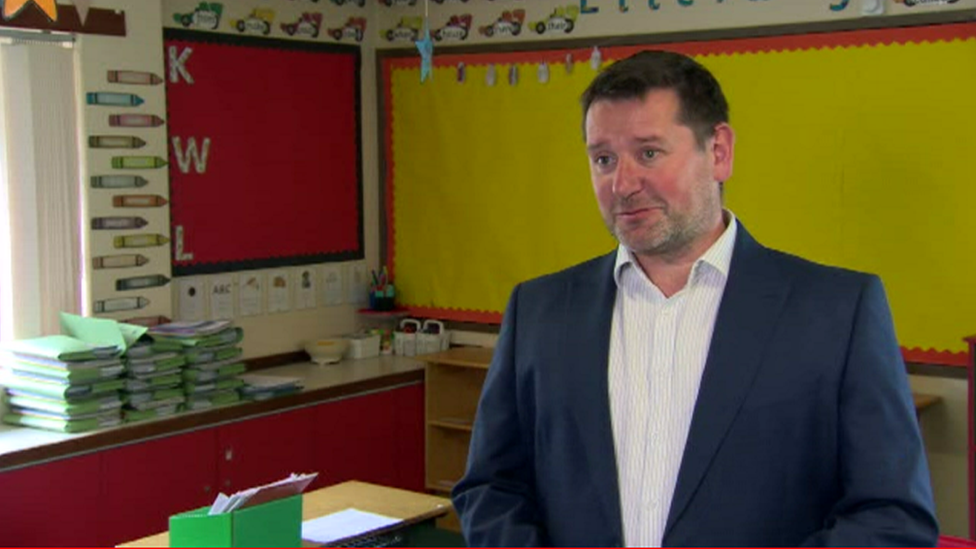NI Education: Teaching unions take industrial action over pay
- Published
- comments

Teaching unions in Northern Ireland are set to take "unprecedented" joint industrial action over pay.
Members of the INTO, NAHT and NEU have voted to take co-ordinated action short of strike, and members of the UTU are expected to follow.
Teachers in the NASUWT union previously began industrial action short of a strike in May.
Members of the INTO and NAHT have also voted to give their unions a mandate for strike action.
The votes came after teaching unions in Northern Ireland rejected a pay offer from employers as "inadequate" earlier this year.
According to the unions, the teaching employers claimed the deal was a 3.2% increase over two years.
But the unions said the deal consisted of a restructure of pay grades which cost less than an equivalent pay offer of 1% each year.
Since then, inflation has risen to almost 10%, driven largely by the rising cost of food and fossil fuels.
The Irish National Teachers' Organisation (INTO) has about 7,000 members in Northern Ireland.
About half voted in their ballot for industrial action, with 98% voting for action short of strike and 85% for strike action.
'Teetering on the brink'
In a statement, INTO's Northern Secretary Gerry Murphy said the result was "a clear manifestation of the frustration and anger our members and teachers as a whole are feeling".
Mr Murphy said the co-ordinated action short of strike by the unions was "unprecedented", but would not interfere with the teaching and learning of children.
The joint action short of strike that the unions are expected to take will involve things like a boycott of assessments - apart from formal assessments like GCSEs or A-Levels, for instance - and attending only one school meeting a week.
It also affects other duties such as administrative tasks, lesson plans, refusing to take on any unpaid duties, and participation in boards of governors' meetings.

Graham Gault said the education system was "teetering on the brink"
BBC News NI understands that the action may escalate if the pay dispute is not resolved.
The National Association of Head Teachers (NAHT) has fewer members in Northern Ireland than INTO, but represents many school leaders such as principals and vice-principals.
On a 68% turnout, 93% voted in favour of action short of strike, and 62% voted in favour of strike action.
The NAHT's Northern Ireland Director Dr Graham Gault, said that the education system was "teetering on the brink".
"Removing co-operation is a loss of confidence in government," he said.
"Education is an investment in the future of Northern Ireland, not a burden on the public purse".
'Unity of purpose'
Meanwhile, National Education Union (NEU) members in Northern Ireland also voted to take action short of strike from 11 October.
The union's regional secretary in Northern Ireland, Mark Langhammer, said it had taken strike action only once in its 130-year history.
He said the joint action showed "unprecedented unity of purpose, with all five recognised teachers' unions engaging in coordinated action".
"The actions do not target the education of our children," he said.
"They will target unnecessary bureaucracy, administration, hyper-accountability and teacher-surveillance."
Speaking on the BBC's Good Morning Ulster show, Mr Langhammer said the fact pay had fallen behind for teachers in Northern Ireland had led to shortages in areas including maths, home economics, sciences and computing.
"It is not an attractive graduate profession anymore," he said.
While the results of the Ulster Teachers' Union (UTU) ballot have not yet been revealed, their members are also expected to back strike action and action short of strike.
However, the teaching employers have previously warned that teachers taking action short of a strike could have pay deducted for breaching their contract.
Any pay award to teachers would be dependent on the Stormont Executive reaching agreement on public sector pay policy and an education budget.
There has been no executive in Northern Ireland since February, however, when the then DUP First Minister Paul Givan resigned as part of the party's protest against the Northern Ireland Protocol.
Related topics
- Published28 September 2022

- Published9 May 2022
